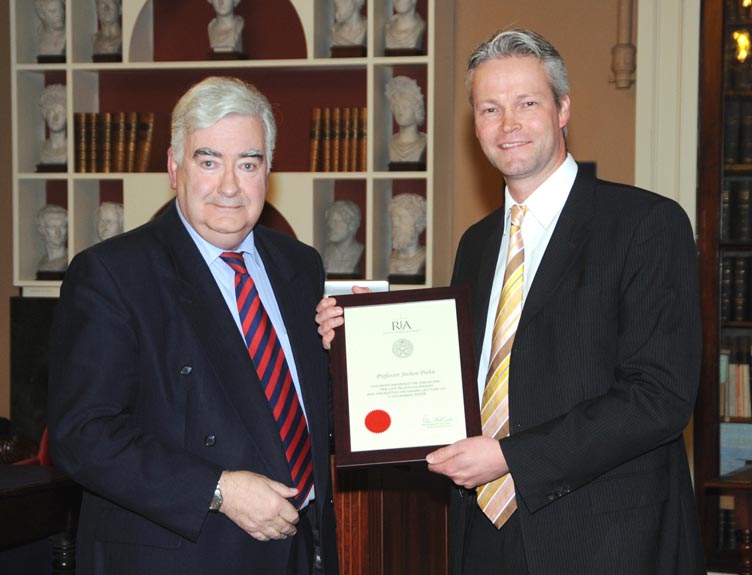Professor Jochen Prehn delivers Royal Irish Academy Life Sciences Award lecture

Professor Jochen Prehn, the Head of Physiology at RCSI delivered the inaugural Royal Irish Academy Life Sciences Award lecture. More ...
In his lecture, entitled ‘Bench-to-Bedside Research – a Two Way Street’, Professor Prehn spoke about how current research programs at RCSI attempt to translate ‘bench’ research findings – in which scientists study disease at a molecular or cellular level – into the clinical level, or the patient’s ‘bedside’.
Professor Prehn took up the Chair of Physiology at RCSI in 2003. He was appointed as Ireland’s first Science Foundation Ireland Research Professor, and since then has led several interdisciplinary and translational research programs in the areas of cell death and cell surviving signaling. Professor Prehn said: “To improve human health, scientific discoveries must be translated into practical applications. This includes the application of interdisciplinary approaches in order to gain understanding on a systems rather than single gene level.”
In his lecture, Professor Prehn highlighted a number of RCSI research projects including:
- Colorectal cancer: Professor Prehn’s research group has developed a systems biology model which predicts the likelihood cells will die based on amounts of cell death related proteins within the cell. The group are currently examining whether it may be translated into the clinical setting for use in determining whether a patient with colorectal cancer will respond to chemotherapy.
- Diabetes: This disorder, characterized by too much glucose in the blood, is expected to affect 157,000 people in the Republic of Ireland by 2030. Professor Prehn’s research group is working to combat diabetes by identifying genes and proteins involved in the early stages of this disease. Such discoveries could stimulate regeneration, and could potentially be exploited as biomarkers or ‘warning’ signs, enabling clinicians to follow disease progression and treatment responses.
- Motor neuron disease: Professor Prehn and his team are working on novel therapies in the treatment of the fatal neurodegenerative condition motor neuron disease. The current findings have shown that protein misfolding accelerates disease progression, and have identified new strategies to combat this disease by exploring the potential of angiogenin to protect against the consequences of protein misfolding.
The Royal Irish Academy is Ireland’s academy for the sciences and humanities. It promotes excellence in scholarship, recognises achievements in learning, directs research programmes and undertakes its own research projects. It advises on and contributes to public debate and public policy formation on issues of major interest in science, technology and culture.
Professor Peter Mitchell, Science Secretary of the Royal Irish Academy, said: “This award lecture showcases the value of ongoing research work in Ireland by its practical application in healthcare. Professor Prehn is recognised for his skill in communicating complex scientific ideas to a broad audience of laypeople and experts alike, and for his international reputation which has raised the profile of Irish neuroscience.”



